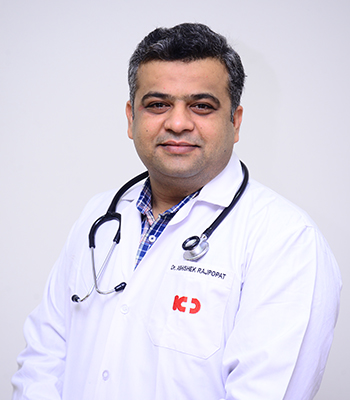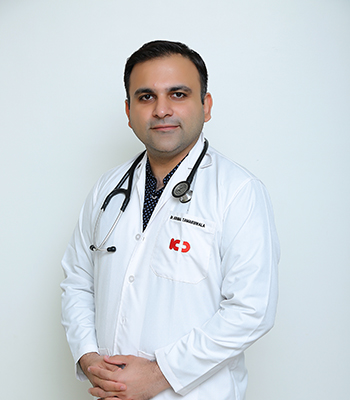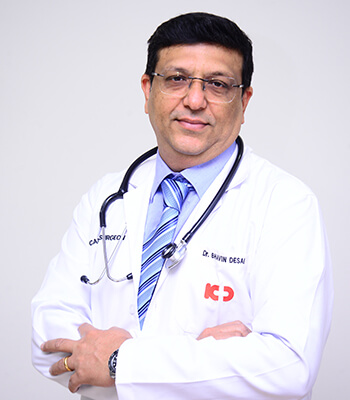Heart Valve Clinic
Heart Valve Procedures:
Heart valve procedures are the operating procedure to treat the Valvular Diseases of the heart. Valvular diseases have a defect in at least one valve out of four of them. Valves of the heart help in moving the blood in the right direction.

There are four valves of the heart:
- Mitral Valve
- Tricuspid Valve
- Pulmonary Valve
- Aortic Valve
Each of these valves consists of flaps which are known as leaflets in mitral and tricuspid valves and cusps in aortic and pulmonary valves. With each heartbeat, these flaps open and close, allowing the blood to flow at right time in the right direction. Defect in the structure or function of these flaps results in disruption of the blood flow either inside of the heart or outside of the heart. In such cases, a heart valve procedure is required to correct the function and/or structure of these flaps/valves.
How the expert is going to treat such conditions entirely depends upon the patient's existing condition, associated symptoms, age, the severity of disease, and other relevant factors.
Heart Valve Defects can be of two types:
- Stenosis: Narrowing of the heart valve
- Regurgitation: Leakage in the heart valve leading to backflow of the blood
If the patient does have any of these conditions, they may need heart valve procedures. The course of treatment may differ from patient to patient depending upon the associated factors. The patient can consult a Cardiology Expert for the evaluation of the condition and treatment plan.
If the patient has a mild variant of these conditions or they don't have any symptoms, the doctor may indicate monitoring the condition for time being. Such cases might be handled with medications and a healthy lifestyle over a period of time. However, the affected heart valve may need repair or replacement with time and/or in severe symptomatic conditions. An expert cardiologist would be able to suggest the right course of treatment according to the condition. The doctor will review the patient's present illness and past medical history and will suggest the treatment whether the patient needs heart valve repair or replacement. The doctor sometimes suggests heart valve repair in case the prognosis is favorable, however, heart valve replacement typically remains the dominant treatment option.
KD Hospital offers a gamut of Heart Valve Surgeries:
- Transcatheter Aortic Valve Replacement/Implantation (TAVR/TAVI): TAVI is a treatment option for aortic stenosis which is a minimally invasive procedure. It means it does not require a cut-through-chest surgery. The aortic valve is approached through a thin tube known as a catheter via an artery near the groin region. KD Hospital's Team of Interventional Cardiology has been doing these minimally invasive surgeries in state-of-the-art operation theatres. This option is the best treatment option for those patients who cannot undergo open-heart surgery or who are at a greater risk for the surgery. Additionally, more than 95% of the patients are treated under Local Anaesthesia. Our Dedicated Team of Heart Valve Clinic has experience in performing more than 300 TAVR procedures domestically and internationally.
- Transcatheter Mitral Valve Replacement (TMVR): This is yet another minimally invasive procedure that can treat defective mitral valve in presence of an existing tissue valve/ring. In this procedure, the catheter is inserted through the leg or chest and directed towards the mitral valve for the replacement of the same.
- MitraClip: At present, FDA-approved MitraClip is used for Edge to Edge Mitral Valve Repair. These devices are best used in patients with Mitral Regurgitation who cannot undergo open-heart surgery.
- Transcatheter Pulmonary Valve Replacement (TPVR): TPVR is typically performed in patients having paediatric/adult congenital heart defects involving pulmonary valve. This procedure is also being performed under Local Anaesthesia in most cases.
- Balloon Valvotomy: This procedure is an interim procedure to expand the valve in case of stenosis. It requires inserting the catheter with the balloon through the vessel of the arm or groin region. When the interventional cardiologist inflates the balloon near the valve, it widens the opening of the valve. This procedure improves the blood flow within the heart and may as well improve the symptoms.
- Aortic and Mitral Valve Replacement (Open Heart Surgeries): These replacement procedures are open-heart surgeries, meaning the Cardiac Surgeon opens up the chest to reach the heart and hence the defective valve. This procedure is done under General Anaesthesia and complete sedation. The patient's damaged/diseased/defected valve is removed and replaced with the new valve so to restore the normal blood flow and function of the heart.
In the case of Transcatheter Heart Valve surgery, the patient recovers quickly and is able to drink fluids and eat food the same day of the surgery. The patients are even able to walk in a day or two after the surgery. However, in Open Heart Valvular Surgeries, the patient may need to stay in the ICU for a day or more and then be shifted to the ward. These patients can start intake with fluids and IV medications. The Cardiac Team will keep monitoring the patients in any of the surgeries for subsequent infection or adverse reaction till the day they get discharged. They will also keep an eye on the vitals of the patient and pain management. As the patient recovers, they will be able to walk and raise the activity level accordingly. Before discharge, the doctor will discuss and instruct on the diet, lifestyle modification, and medications.
Non-Surgical Procedures:
- Transcatheter Aortic Valve Replacement (TAVR)
- Transcatheter Pulmonary Valve Replacement
- Transcatheter Tricuspid and Mitral Valve Replacement (For valve in valve and valve in ring)
- Caval Valve Replacement (for severe tricuspid regurgitation)
- Mitra-Clip (For severe mitral regurgitation)
- Paravalvular Leak Closure
- Balloon Valvotomy (Aortic, Mitral, Pulmonary)
Surgical Procedures:
- Mitral Valve Replacement
- Aortic Valve Replacement
- Tricuspid Repair in Paediatric Patients
- Aortic Stenosis
- Severe Pulmonary Regurgitation
- Right Ventricular Outflow Tract Obstruction
- Tricuspid Regurgitation
- Mitral Valve Diseases including Mitral Regurgitation
- Paravalvular Leaks
- Atrial Septal Defects
- Pulmonary valve defects in Tetralogy of Fallot, Truncus Arteriosus






